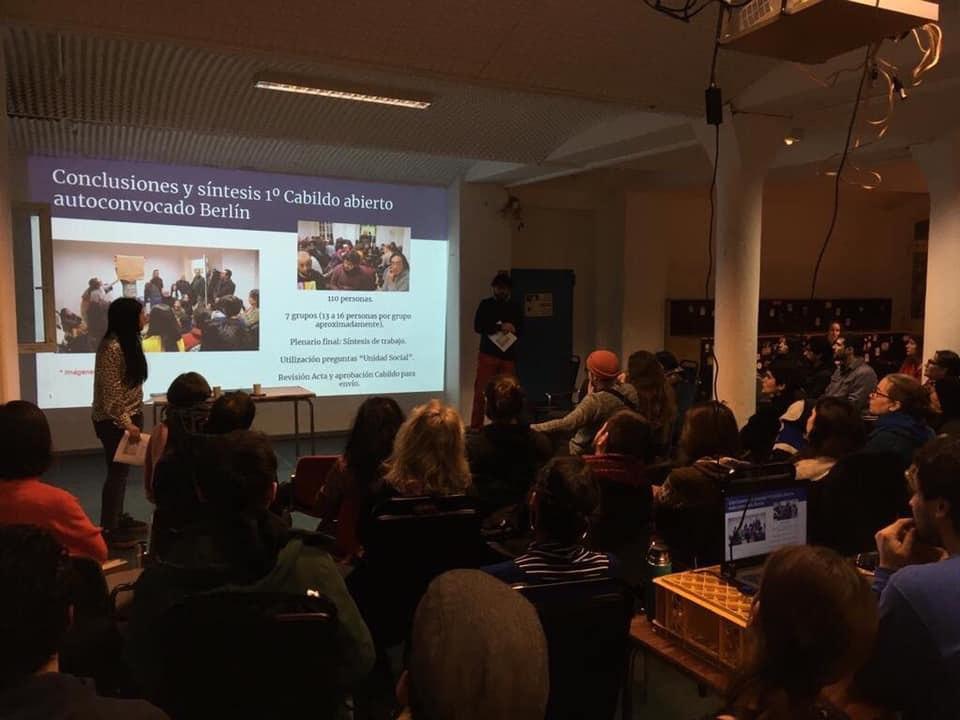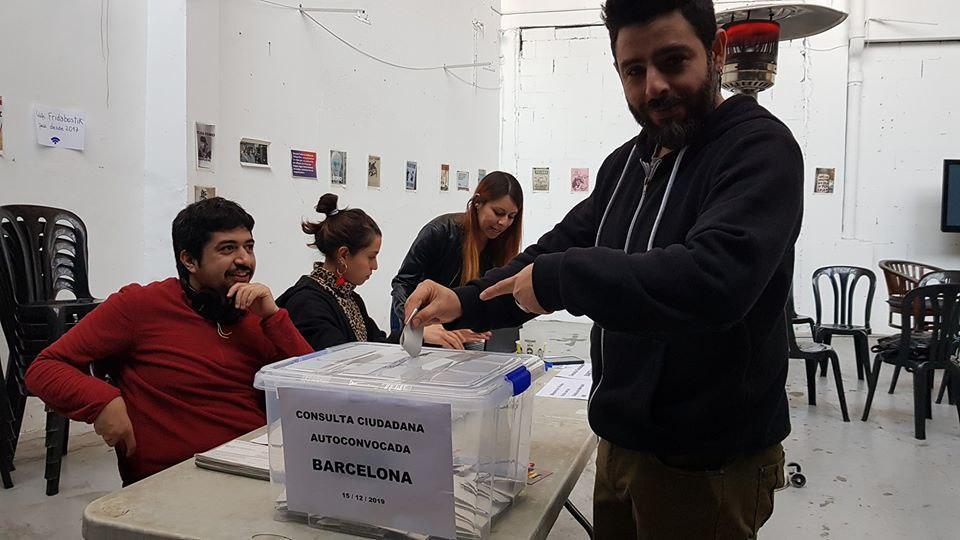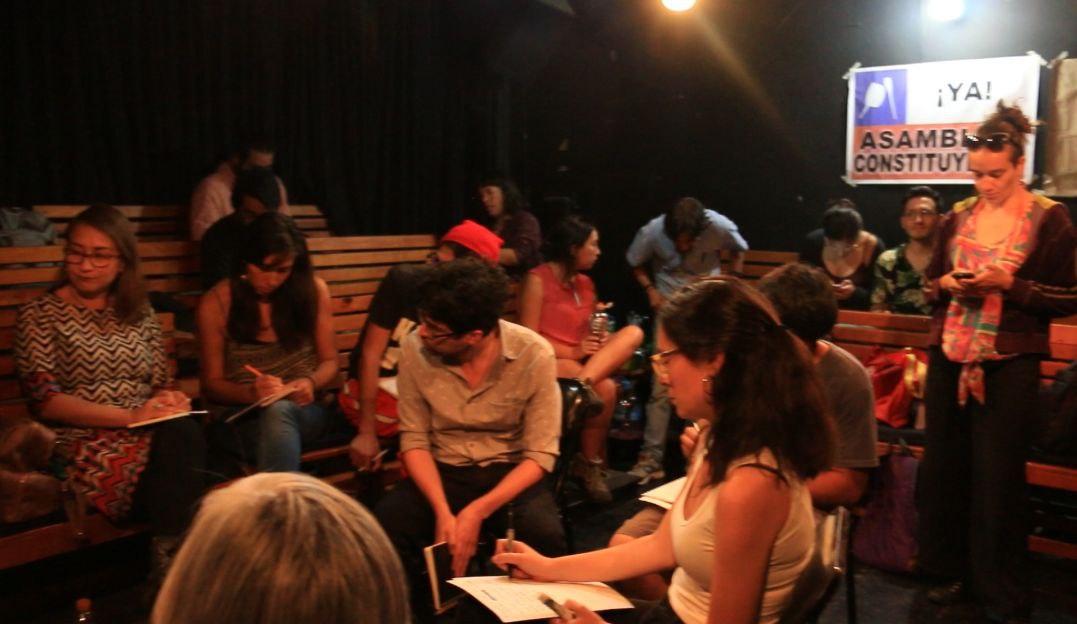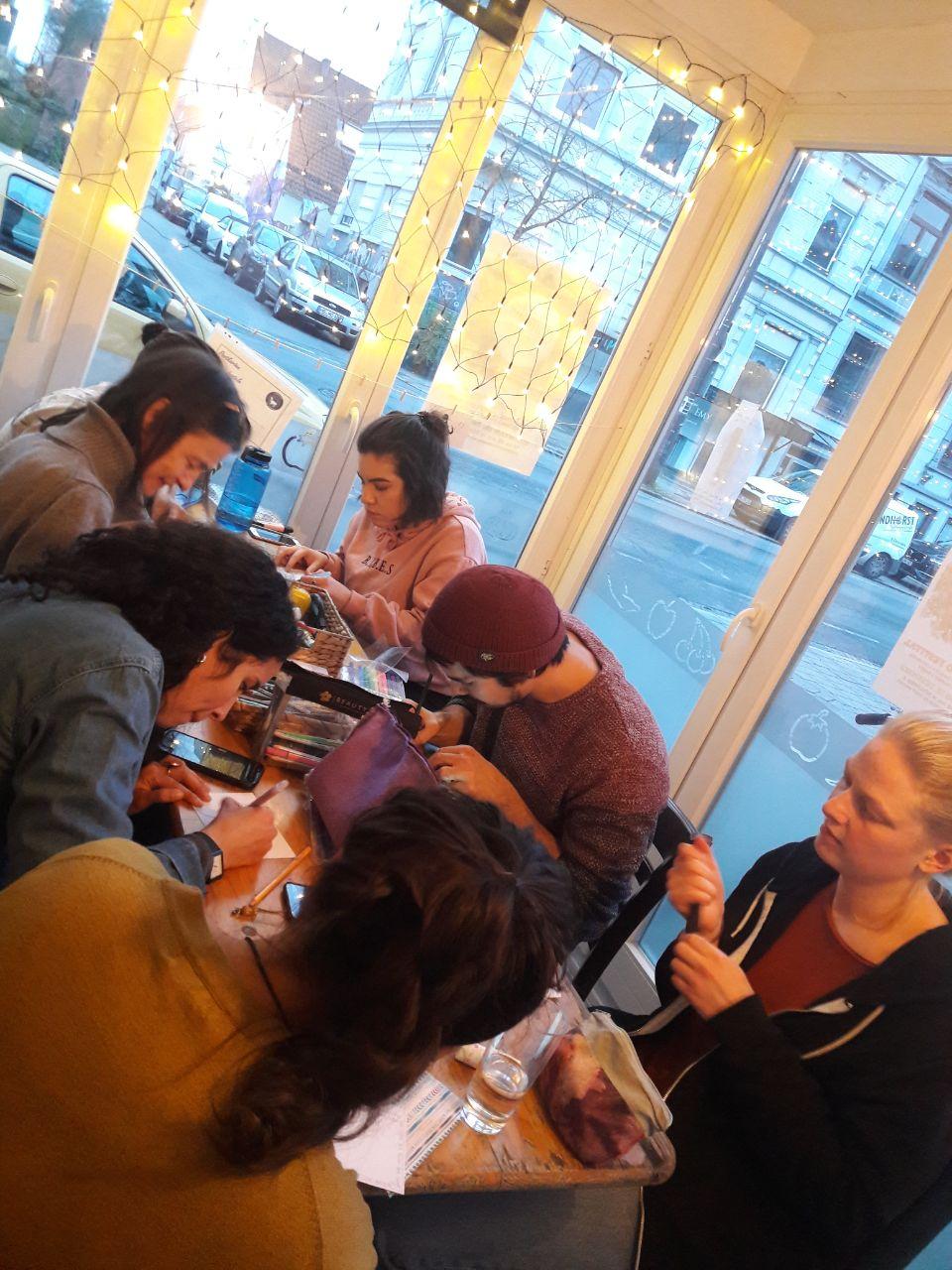IT’S NO LONGER ENOUGH TO VOTE! The Campaign by Chilean Communities Abroad denouncing their Exclusion from the Electoral Process
Wednesday, June 10th, 2020

Source: Cabildo Berlín Chile
The awareness of the significance of civic participation abroad has been growing and with it a sensitivity about the restrictions imposed on it for those living outside of Chile. We have started to feel like people with second class civil rights, because we’ve been marginalized from the right to choose or to be chosen as constituents. Thus, the campaign: “It’s no longer enough to vote!” by ChDI was born.
BY:
- Sebastian Boye (Mannheim, Alemania)
- Marisol Torres (CDMX, México)
- Betzabeth Marín-Nanco (España, Barcelona)
- Trad. Zainab Ebrahimi (NY, Estados Unidos)
Do those of us living abroad have the right to participate in the electoral process? For those of us living outside of Chile, this question has been making its rounds in conversations with friends and family, but also in organizations and collectives we have formed in cities around the globe. Usually, the answer is “Yes, we want to participate. We have the right, because we also dream of a different Chile, we can return to one day!”. However, the prospect of being able to participate in the electoral process has clear obstacles and limits.
What kind of participation are we allowed?
It’s important to know that those of us living abroad have the right to vote in presidential elections and referendums. Therefore, we will be able to vote in the referendum in October, by which the process of creation of a new Political Constitution for Chile will be decided on. It is of relevance to note that voting in the initial referendum will be optional for those residing in Chile, both for nationals and foreign residents, but the referendum for the ratification of the new constitution will be mandatory. The fact that the criteria is different for both elections definitely jumps out, but that is a topic for another article. What is of interest, is that voting will be optional for both elections for those of us living abroad.
Another obstacle that undermines our participation is the poor functioning of the bureaucratic apparatus for electoral address changes. We had until 140 days before the closing of electoral registrations to change the territory from which we were going to vote, but that required going to the Consulate and communicating with the SERVEL to obtain a unique code and confirm our residence in each city. This process required an investment of time and money, given you had to physically go to your respective consulate. In Europe, an example is Spain where the investment is considerable because there are only two Chilean consulates in the entire country (Barcelona and Madrid), forcing those living far from those cities, for example in Granada, to buy round trip tickets for every member of the family who wants to vote. In Latin America, in big countries like Mexico, where the consulate is in Mexico City and people in Chiapas or Chihuahua are 20 hours away it is very hard and expensive to travel. There was a time where there were many more consulates and offices that assisted and protected Chileans living in each country, but they have since been closing their doors without a virtual counterpart or more simplified processes that help support our existence abroad. Therefore, who guarantees we will have the same civic rights that we had when we were in Chile? Why are we not guaranteed the access to technologies that could enable our connection with our country and with the same rights?
The context of COVID19 has increased the complexities to change our electoral address. Many consulates have closed, hence leaving those who were following the proper procedures to change their address with no answers and unable to complete it in time. This coupled with the stay at home orders and the risks of infection from going outside paint a dire situation: What to do?

Source: Asamblea Chile Despertó Barcelona
What kind of participation do we want?
The initial involvement of Chileans abroad in the demonstrations in favor of the Chilean social uprising were spontaneous, creative and sudden. In many cities around the globe, people raised their voices in disbelief of what was happening in the major cities of Chile starting October 18th of 2019. This is when assemblies and self-convoked town halls formed internationally to converge views on the events. The network Chile Despertó Internacional allowed for the swift organization of many Chileans united by the same cause. Currently, we strive to continue to work together with the same objectives regardless of borders by seeking a more just and egalitarian Chile.
That the demonstrations in Chile led to the urgent need to change the constitution did not go unnoticed abroad. We joined the town halls and citizen consultations summoned by the municipalities in Chile in December. We questioned the current state of affairs in Chile and wondered about the country we dream of and the ways we can make it a reality. In a press statement on December 20th, 2019 about the recent events the spokesperson for the assembly in Paris is quoted saying
“The citizen consultation on December 15th was an opportunity to show with clarity our commitment with the process in Chile. On one hand, our desire is to be an active part in the construction of a new constitution by ways of a constituent led assembly, and on the other, advocate for our right to vote and the representation of the Chilean community abroad. The consultation was an autonomous and self-convoked activity, therefore an effort organized by the people, that allowed the convergence of different generations regarding solidarity and the common struggle for the transformation of Chile”.
Within this context, some of us realized the importance of being an active participant in the process, we questioned the ways it was unfolding and concluded it would be worse to exclude ourselves in this historic moment. We have since decided to exercise our right to vote, something many of us had given up on many years ago -even whilst living in Chile- because we didn’t feel represented by the political establishment. But, is voting to initiate or conclude the constituent process enough?
The local discussion that occurred in different cities like Hong Kong, Buenos Aires, Copenhagen, New York, Rome or Barcelona led to a debate about the living conditions in Chile and the way the State protects us (or not) while being abroad. Multiple demands and proposals were born out of these discussions, based on the diverse realities that have allowed us to see what it’s like to live in other parts of the world. But we haven’t found spaces where we can communicate about them, much less propose them so they can be considered in the discussions of what a new Chile could look like. This is where we re-examine the question about our participation abroad. We have the willingness to vote, propose agendas, participate in civic consultations and bring to the table success use cases from the countries we live in that could be an added perspective for the discussion of a new constitution, but we DO NOT have a place in the Constitutive Convention. Our participation is limited to marking a ballot.
Thus, we have come to realize we are second class voters. We do not have the civil and political rights to elect or be elected to collaborate in the creation of a new constitution. The people living abroad, just like our native people, women and independents, have the right to representation in the Constitutive Convention, if we want it to be a truly democratic space. We are more than a million people living abroad, and we no longer only want to reject or approve the new constitution. Therefore, the campaign “It’s no longer enough to vote” by ChDI was born, paraphrasing the Chilean movie title by Aldo Francia in the 60’s “It’s no longer enough to pray”. The campaign is a diagnostic of our limited participation, but also a way to shed light to our proposals so they can be broadened significantly within the process.

Asamblea de Chilenxs Movilizadxs en la CDMX, México
How can we broaden our participation in the constitutive process?
We now know we want more! We know we can vote, but we want our participation to be core to the constitutive process. This is the most important step we are demanding, and it entails a change in the current regulations governing automatic registration and optional voting in effect since January 31st, 2012 via Law N° 20.568.
The mandate of this law is basic. It establishes automatic electoral registration to everyone who meets the requirements to vote, which are to be Chilean, over 18 years old and have not been convicted of or accused of committing a crime or misdemeanor that can result in a jail sentence of three years and one day or more, or to be a foreign Chilean resident for more than 5 years and have not been convicted of or accused of committing a crime or misdemeanor that can result in a jail sentence of three years and one day or more. This means, simply, that once we turn 18 years old, we are automatically registered in the Chilean electoral system (SERVEL), including foreign Chilean residents meeting the criteria mentioned above, in accordance to their last registered address in the country. For all intents and purposes, they are all considered voters, by Law N° 20.568, Art. N° 66:
the citizens with suffrage rights and foreigners who appear in the voter lists and have attained the age of eighteen years on polling day. The voter who goes to vote must do so for all other elections and referendums called for during the same electoral event.
However, the procedures to change one’s address while abroad, for example, the voter lists assigned are subject to territorial regulations that tend to be hard to organize, leaving it in the bin of unresolved paperwork. A testament to this, is that the there are more than a million of us living abroad (INE) [1], less than 6% of us are qualified to vote in October [2].
The reason Chileans decide to leave their country and live somewhere else are as varied as the destinations they choose to live and develop a life in search of the dignity lost in their own country. But we always look back to Chile and many of us do so with the nostalgia of returning one day. Therefore, we have gotten involved in such an active way to collaborate with the social movements in Chile, by propagating and supporting their demands. It’s painful to see the economic and logistical obstacles do not allow us to get involved even more. It hurts because it restricts the possibility of participation for those who feel the reconstruction of the country is a task for all of us. It hurts because we know that to end neoliberalism in Chile, we must all stand up. It hurts because we know it’s not a drought but pillaging what is happening with our water and so much more in Chile and we know that protests are our right. It also hurts to have the right to vote and to express our voices in the new constitutive process but not being able to exercise it if you were unable to change your electoral address for whatever reason.

Cabildo Abierto de Bremen
The current regulations evidently do not favor the social change Chile needs. The regulations require changes that include all Chileans living abroad under the same conditions, regardless of location or economic standing to be registered automatically the moment they arrive in another country, therefore enabling the possibilities of their participation in the process of creation of the new constitution.
This is a simple motion, given all the countries we arrive at have consulates and our departure from Chile is recorded by the Investigation Police of Chile (PDI), so the proceeding is not a costly one, but one of political willingness and humanitarian judgement. Our demands are to have the same rights we had in Chile while abroad. No less, but no more either. We aren’t the first to ask this of the State during a constitutive process, nor will we be the last [3].
We need a Chile that is more inclusive, a Political Constitution that represents the diverse collectives that form it and the specific rights to those who live abroad. Hence, it is incumbent for those of us living abroad, independent of how temporary our stay and condition is, the election of representatives in the constitutive convention that will elaborate the new constitutional text and will also mean that we are included in it. The new Chile must be a participative democracy for all Chileans, hence the phrase “con todos si no pa’ que” (with everyone otherwise why even). Those of us living abroad have an agenda that is in alignment with the demands of the social movements in Chile and our native peoples. The network Chile Despertó Internacional (ChDI) reflects those demands and being represented is required. That is why we say and will continue the struggle to have our own place, now it’s no longer enough to vote!
__
REFERENCIAS
[1]https://www.emol.com/noticias/Nacional/2018/01/10/890704/INE-revela-que-1037346-chilenos-viven-en-el-exterior-El-402-en-Argentina.html
[2] https://www.servel.cl/servicio-electoral-publica-el-padron-electoral-definitivo-para-este-plebiscito-nacional-2020/
[3] Ejemplos de representatividad de nacionales en el exterior: Actualmente, los órganos legislativos de Colombia, Ecuador, Francia, Italia y Portugal tienen escaños para nacionales residentes en el extranjero. En Colombia hay un representante incluido como parte del distrito de Bogotá. Ecuador tiene 6 asambleístas, divididos en 3 distritos. Francia tiene 11 representantes en la cámara baja, cada uno representando un distrito. Italia tiene 12 diputados y 6 senadores, representando 4 distritos. Portugal tiene 2 representantes para 2 distritos.
